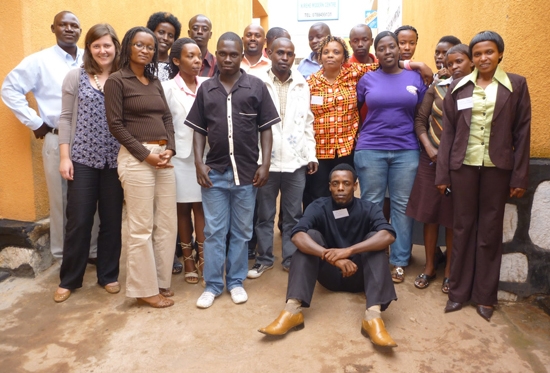An interview with...
Emma talks about how the four months she spent volunteering in Rwanda began her career in the international development sector.
Are you normally the type of person that does volunteering? What motivated you?
I have thought about volunteering for a long time and had recently qualified, so it was time to decide whether I wanted to further my career where it was or look around. I decided to go and work in Africa.
However, rather than me being so brave and jump ship entirely, AfID was a good way to try out if this is something for me. I decided to do volunteering for four months and if I liked it I could start looking for paid work in the international development sector. At the same time I was on a career break, so I had the option of going back if it didn’t work out.
Why did you choose Africa?
I didn’t have a particular reason, it just seemed a place I knew very little of and wanted to find out more about. I knew a lot of people, who had visited Africa and I got the feeling from them and from reading the press that Africa has a real desire to develop, so I wanted to go and be involved in that.
What was so appealing about the organisation and the nature of the placement at Partners in Health in Rwanda?
I wanted to go to Uganda and Rwanda, because I liked the idea of going to see the gorillas. People tend to think that Rwanda has dark history and don’t know much about it, but it is the safest place to go. I was so pleasantly surprised. I also liked the idea of healthcare and Rwanda has done very much to improve its HIV rate. I was interested in going and seeing this work done first hand.
Did you have any doubts about your ability to add real value before you went?
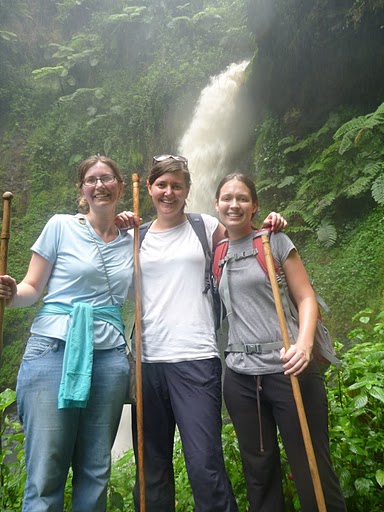 I had huge doubts and I had even more doubts once I got there! PIH is bigger than most of AfID’s partners and before going I had a vision of working with 2 or 3 people. I turned up and discovered that PIH is this huge international organisation. Even in Rwanda, there are 15 people in the finance team and they have three different sites. Initially I thought, oh my god, what am I going to be able to add to this.
I had huge doubts and I had even more doubts once I got there! PIH is bigger than most of AfID’s partners and before going I had a vision of working with 2 or 3 people. I turned up and discovered that PIH is this huge international organisation. Even in Rwanda, there are 15 people in the finance team and they have three different sites. Initially I thought, oh my god, what am I going to be able to add to this.First we were going to hire someone new for an internal audit function, but we didn’t find a suitable candidate so they thought that I should start doing it myself. PIH had just recently expanded and started working with 40 health centres. The task was to monitor and audit the reporting between the health centres and PIH offices. A month later I knew that the job wasn’t only audit, but implementation as well. It was such a relief when I finally established my role.
I am relatively young and look even younger and I had to work with people who are much more senior. That was a bit difficult, but they were all lovely and listened to what I was saying. Especially as I was the only qualified person there, they took the qualification very seriously. The staff was very supportive and keen to learn.
What was it like to visit the PIH hospital facilities?
They had just opened a brand new hospital in Burera. In terms of facilities, the hospital hopes to become a model of how to deliver health care in rural Africa. It features an innovative design intended to harmonise with the local environment and reduce the risk of hospital-acquired infections. It has an emergency department; a full surgery ward with two operating rooms, a neonatal intensive care unit, the list goes on. It will even be making use of the impressive hills to supply hydro-electricity.
In addition to the internal audit role you facilitated staff training?
We created a reporting structure, a template what the health centres could use. We also created an audit template, which the accountants in three district offices can use with their health centres. They can look at expenditure and supporting documentation, cash controls, and do some testing on staff to see the accuracy of payroll costs. In a way it was like holding the spinning plates in circus, if you get one going, you quickly do the other. Working with all three districts meant that I went to one team and stayed until they more or less knew what they were doing and then I continued with the next team and later went back to them asking how it was going. I got to visit about 15 health centres, which was amazing. Finally we collated the information, created a recommendation sheet for the health centres and ran a training day in each of the three districts. We talked about findings and introduced a new reporting programme. We did group exercises and practiced using the programme.
As a female travelling on her own, were you nervous about going to Rwanda? Can you offer any advice to others wishing to follow your lead?
It truly is a great place to go, if you have any worries or concerns it is such a safe country. The place I was located was in the middle of nowhere. Rwanda has perpetually rolling hills, which is just stunning and you could go for a hike. I used to go with a friend of mine, two girls together and we were completely safe.
Could you describe some interesting experiences while you were working for PIH?
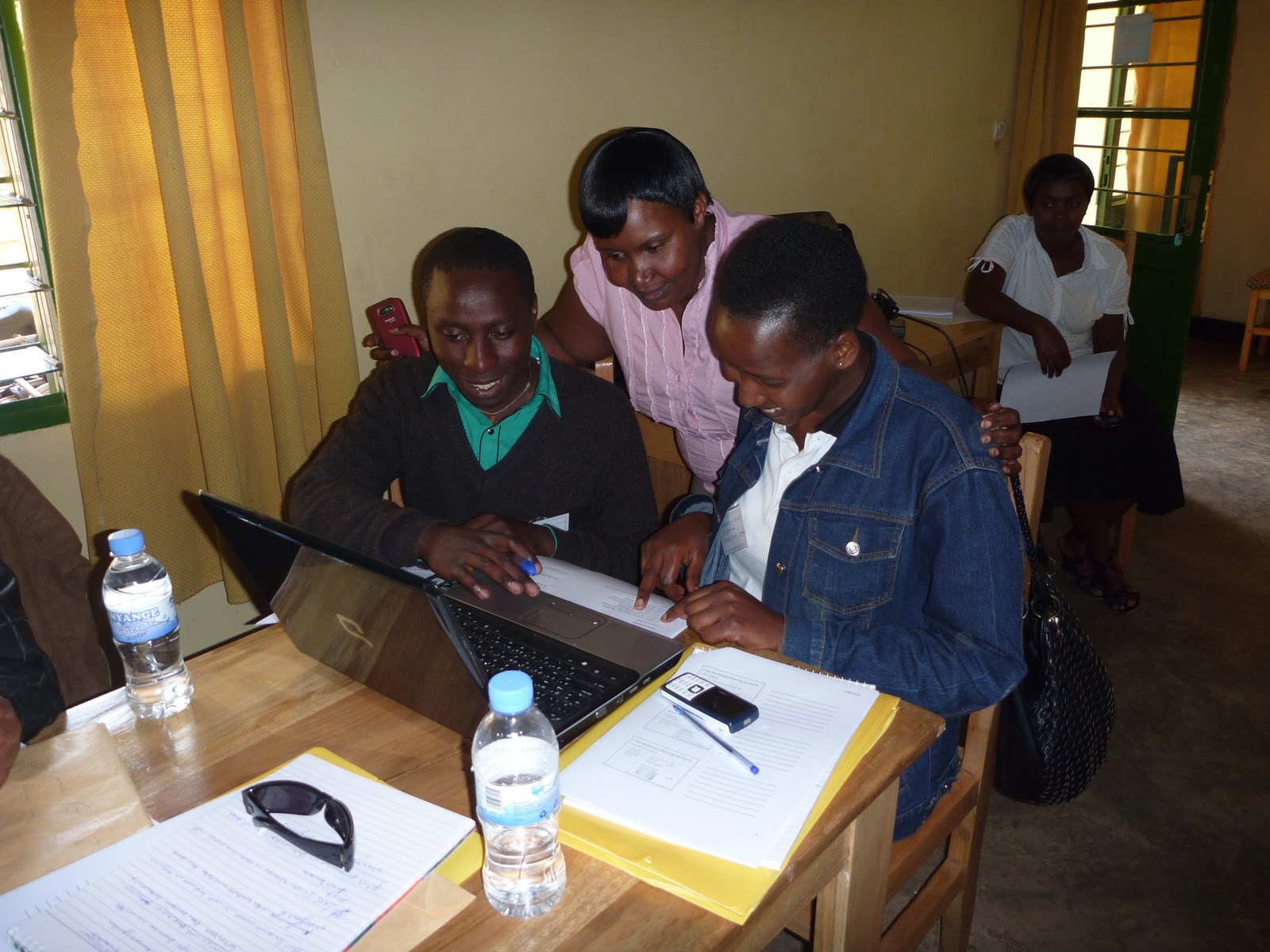 There are so many interesting experiences. I should probably start with meeting the President of Rwanda. He attended one of our events. There was the token ribbon cutting, followed by speeches by the President, the Minister of Health and Dr Paul Farmer, who is the founder of PIH. The president then lead a rally down in the community, and the day ended with traditional drumming and dancing back at the hospital. I also had many other fun events and I did a lot of travelling. I went to Congo, which was amazing. It was probably the best weekend of my whole life.
There are so many interesting experiences. I should probably start with meeting the President of Rwanda. He attended one of our events. There was the token ribbon cutting, followed by speeches by the President, the Minister of Health and Dr Paul Farmer, who is the founder of PIH. The president then lead a rally down in the community, and the day ended with traditional drumming and dancing back at the hospital. I also had many other fun events and I did a lot of travelling. I went to Congo, which was amazing. It was probably the best weekend of my whole life.And I went to see the gorillas. One of the few jokes that I’ve always remembered is one on a lollypop stick from when I was little: Where does a monkey cook his toast? A. Under a gorilla! Well yes, perhaps it is a lame joke, but it seems like fate that I would one day meet a gorilla, and when I did, it was awesome! We spent an hour watching the Amahoro group with great fascination. Amahoro means peace in Kinyarwanda. Before people are able to go and visit a group of gorillas, the group has to be habitualised to humans. The Amahoro group is so named because it took a surprisingly short amount of time for the silver backs to get used to people. Now, it just takes a deep “haaaaaaummmmm” sound from time to time to remind the gorillas that their human visitors are friendly and they go about their business of eating leaves, tidying their nests, etc, as if you aren’t even there.
How did you end up with a paid job in South Sudan; was volunteering with AfID helpful?
Volunteering was very helpful. I loved being in Rwanda and decided that I wanted to do it at least for another year and was looking up jobs on the internet. I met a consultant, who invited me to an international development recruitment event at the University of London. They had various organisations present and one of them was GOAL. I went up to introduce myself and found out that they were looking for finance people. I will be doing an internal audit role for at least six months for them travelling around Sudan and then I could move into a different role. Lot of the things they want me to do at GOAL are similar to the responsibilities I had in Rwanda while working for PIH. Particularly working with the health centres and putting controls in place. It really helped as I could tell GOAL that I have done this already. They were also looking for someone who had some experience from living abroad, so with my AfID Rwanda experience, they were confident that I knew what I was getting myself into.
Do you think the experience of volunteering changed you in any way?
Yes, it has. Especially being in a completely new environment where you don’t know anybody. It taught me a lot about myself, how I socialise with people, cope with different situations and build relationships - I guess what really matters to me. Local staff was so grateful to me for being there, but I don’t think they realised how much I got out of the experience as well. I think we sometimes have too much choice and our life is very stressful. Being with people, who don’t have many choices, but are nonetheless happy, really puts things into perspective. It is nice to keep things simple for a while.


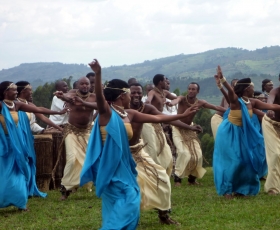
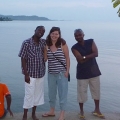 Name
Name